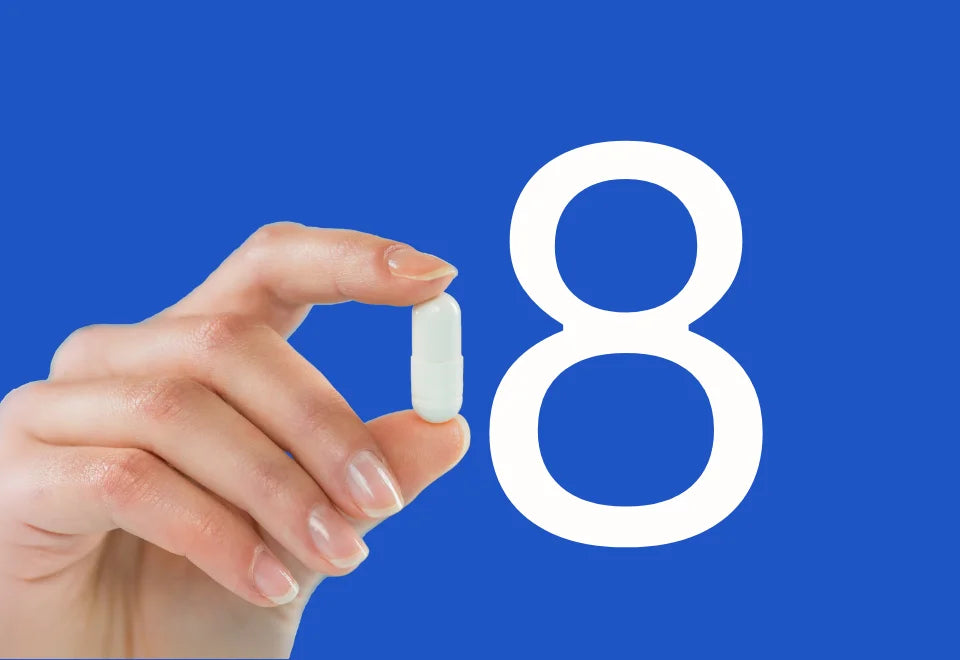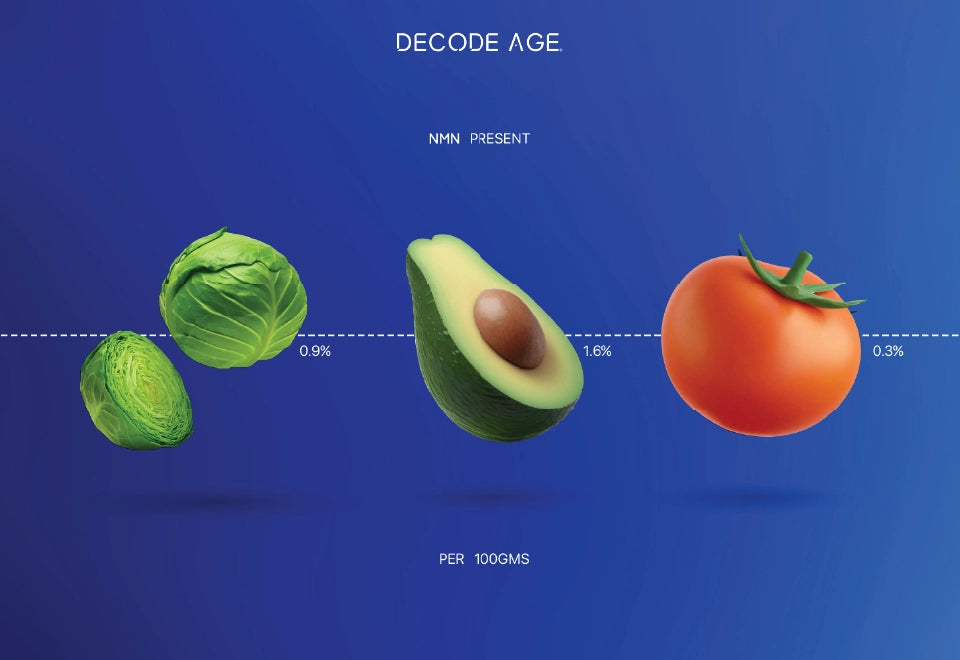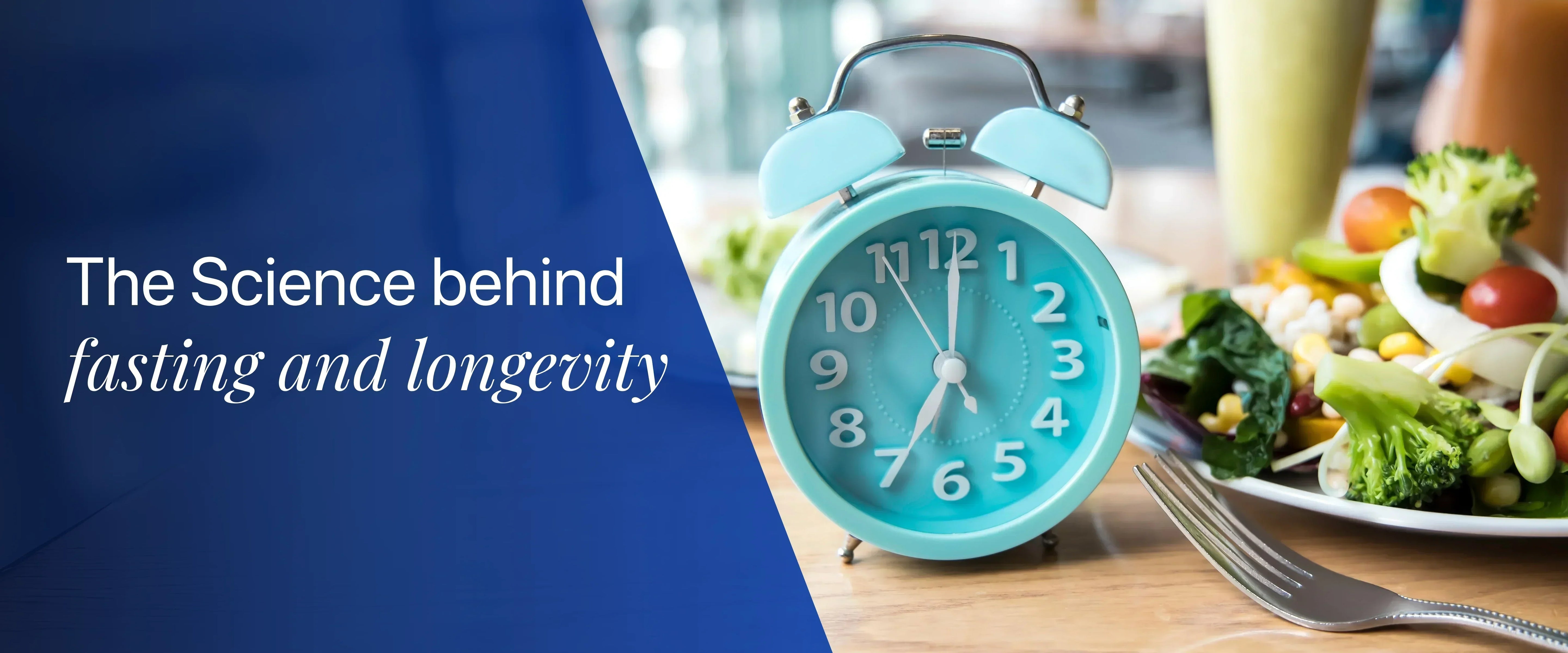Want to age gracefully and stay healthy longer? Research shows that supplements targeting cellular energy, DNA repair, and inflammation can help slow down the ageing process. Here's a quick overview of the top 8 anti-ageing supplements and their benefits:
- Collagen: Improves skin elasticity, hydration, and joint health.
- CoQ10: Boosts cellular energy and reduces oxidative stress.
- NMN: Restores NAD+ levels for DNA repair and metabolism.
- Resveratrol: Activates longevity pathways and reduces inflammation.
- Curcumin: Lowers inflammation and protects cells from damage.
- Omega-3s: Supports brain function and heart health.
- Vitamin D: Strengthens bones and boosts immunity.
- Spermidine: Promotes cellular cleanup and renewal.
These supplements work best when combined with a healthy diet, exercise, and quality sleep. Always consult a healthcare provider before starting any new supplement regimen.
The Biology of Slowing & Reversing Ageing
Ageing is a complex biological process that involves the gradual decline of cellular function, DNA damage, inflammation, and the accumulation of oxidative stress. However, recent research has revealed that certain cellular mechanisms can be influenced to slow or even partially reverse some aspects of ageing. Central to this process are the concepts of cellular energy production, DNA repair, and the regulation of inflammation.
By targeting these key biological pathways, anti-ageing supplements can support healthier ageing by improving cellular health, boosting energy, repairing DNA, and minimizing inflammation, ultimately extending both lifespan and healthspan.
1. Collagen: Structure and Skin Health
Collagen plays a crucial role in maintaining the structure of your skin, bones, and joints. Taking collagen supplements has been shown to improve skin elasticity by 28%, hydration by 22%, and reduce wrinkles by 30% within just 8–12 weeks [1].
"Collagen is the scaffold that gives structure to our skin, bones, and joints. Supplementing restores this structure and improves health." - Dr. Josh Axe, DNM, CNS, DC, Founder of Ancient Nutrition.
Types of Collagen and Their Benefits
| Collagen Type | Benefits | Ideal For |
|---|---|---|
| Type I | Improves skin elasticity and hydration | Anti-ageing and skincare |
| Type II | Supports joints and cartilage | Joint health and mobility |
| Type III | Enhances skin firmness and elasticity | Works best with Type I |
For better results, pair collagen with vitamin C, as it helps your body produce more collagen naturally [2]. You can easily add collagen to smoothies, coffee, or soups for convenience. If you have fish or shellfish allergies, plant-based alternatives are available, offering a different approach to collagen support [3].
When choosing a supplement, focus on quality. Products that combine Type I and Type II collagen often provide more comprehensive benefits for skin and joint health [3].
While collagen addresses visible signs of ageing, other supplements like CoQ10 can complement it by targeting cellular energy and reducing oxidative stress - two key contributors to ageing.
2. CoQ10: Cell Energy and Ageing
Coenzyme Q10 (CoQ10) plays a key role in producing energy at the cellular level and protecting cells from oxidative stress. As we get older, our CoQ10 levels naturally decline, leading to reduced energy and cellular resilience. This drop can speed up the ageing process, making CoQ10 an important factor in slowing down age-related changes.
How CoQ10 Fuels Your Cells
CoQ10 operates within your mitochondria, often called the "powerplants" of your cells. It helps produce ATP, the primary energy source for the body, by supporting the mitochondria in converting nutrients into energy.
| CoQ10 Form | Absorption Rate | Best Time to Take | Recommended Daily Dose |
|---|---|---|---|
| Ubiquinol | 3-4x higher than ubiquinone | With fatty meals | 30-100 mg |
| Ubiquinone | Standard absorption | With fatty meals | 60-200 mg |
| Oil-based softgels | Better absorption | With dinner | 50-150 mg |
Research highlights CoQ10's potential to combat ageing. A major study found that combining daily CoQ10 with selenium over four years brought noticeable benefits for older adults, including:
- Improved physical performance
- Increased energy levels
- Enhanced overall well-being
- Lower cardiovascular-related death rates during a 12-year follow-up [4]
"The combination of selenium and CoQ10 significantly improved vitality and physical performance in elderly individuals, with benefits extending well beyond the supplementation period", stated the research team behind this extensive clinical trial [4].
For the best results, opt for the ubiquinol form of CoQ10, as it is absorbed more efficiently by the body. Regular supplementation is often used to support anti-ageing goals.
Safety and Interactions
Begin with smaller doses and consult your healthcare provider, especially if you're on blood thinners, as CoQ10 may interact with these medications.
While CoQ10 helps generate energy, NMN works differently by increasing NAD+ levels, a molecule essential for cell repair and longevity.
3. NMN: NAD+ Levels and Cell Function
Nicotinamide Mononucleotide (NMN) plays a key role in anti-ageing research. Unlike CoQ10, which focuses on energy production, NMN works by replenishing NAD+ levels. This supports essential cellular processes like DNA repair and gene expression regulation.
The NAD+ Connection
NMN helps restore NAD+ levels, which naturally decline with age. By doing so, it activates sirtuins - proteins that maintain cellular health and longevity. This restoration aids critical processes that promote healthier ageing.
| Age-Related Changes | NMN's Impact | Cellular Benefits |
|---|---|---|
| Decreased NAD+ levels | Boosts NAD+ by 60% | Supports DNA repair |
| Lower energy production | Enhances mitochondrial function | Improves cellular energy |
| Slower metabolism | Regulates metabolism | Strengthens cellular resilience |
| Weakened DNA repair | Activates sirtuins | Improves gene expression |
Dr. David Sinclair of Harvard University emphasizes NMN's potential:
"NMN supplementation has the potential to be a game-changer in the field of ageing research" [5]
Tips for Best Results
- Take NMN supplements in the morning.
- Pair with a meal containing fat to improve absorption.
- Follow the dosage recommended by the manufacturer.
Safety Considerations
Before starting NMN, consult a healthcare provider, especially if you're on medication for blood pressure or diabetes. Always opt for supplements from trusted brands to ensure quality.
While CoQ10 focuses on mitochondrial energy, NMN improves overall cellular metabolism and DNA repair.
4. Resveratrol: Longevity Pathways
Resveratrol plays a key role in supporting longevity by working through multiple cellular mechanisms. This polyphenol, naturally found in red wine and grapes, activates proteins called sirtuins, which are involved in regulating the ageing process. Its ability to mimic the effects of caloric restriction and reduce inflammation makes it an important part of anti-ageing approaches.
Sirtuin Activation and Cellular Health
Resveratrol activates SIRT1, complementing NMN's role in cellular repair and metabolism. This activation benefits several critical cellular processes:
| Cellular Process | Resveratrol's Effect | Health Impact |
|---|---|---|
| DNA Repair | Boosts sirtuin activity | Supports genetic stability |
| Metabolism | Mimics effects of caloric restriction | Promotes metabolic health |
| Inflammation | Reduces oxidative stress | Protects cells |
| Cardiovascular | Improves blood pressure regulation | Supports heart health |
Harvard genetics professor David Sinclair highlights its importance:
"Resveratrol is a potent activator of SIRT1, and this activation is associated with improved metabolic function and longevity."
Tips for Effective Use
To maximize its benefits, take resveratrol with a meal that contains fat to improve absorption. Look for high-quality trans-resveratrol supplements with better bioavailability for the best results.
Combining Resveratrol with NMN
Using resveratrol alongside NMN can amplify anti-ageing effects. Together, they boost NAD+ levels and sirtuin activation, enhancing overall cellular function and promoting longevity.
Safety Notes
Resveratrol is generally considered safe when used correctly, but dosage is important. Consult a healthcare provider if you're on medications like blood pressure or blood thinners. Always opt for supplements from trusted brands to ensure quality and effectiveness.
While resveratrol focuses on longevity through sirtuin activation, it complements other compounds like curcumin, which target inflammation and oxidative stress for additional anti-ageing benefits.
sbb-itb-55c436e
5. Curcumin: Inflammation and Ageing
Curcumin, the key compound found in turmeric, plays a role in promoting cellular health and longevity. Unlike many supplements that focus solely on cellular energy or DNA repair, curcumin's standout feature is its dual ability to manage inflammation and oxidative stress.
How Curcumin Protects Cells
Curcumin supports anti-ageing by activating protective proteins and reducing harmful inflammation. It works through various mechanisms to help maintain cellular health:
| Mechanism | Effect | Benefit |
|---|---|---|
| Anti-inflammatory & Antioxidant | Lowers inflammation and oxidative stress by targeting COX-2 and NF-κB pathways | Protects cells from damage |
| Brain Support | Decreases inflammatory markers in the brain | Helps maintain cognitive health |
Improving Absorption
"Curcumin has been shown to have potent anti-inflammatory and antioxidant effects, making it a promising compound for the prevention and treatment of age-related diseases."
To maximize curcumin’s effectiveness, combine it with piperine (found in black pepper). This pairing can increase absorption by up to 2,000% [6].
Dosage and Considerations
Studies suggest taking 500–2,000mg of curcumin daily for its anti-ageing effects. For better absorption, always pair it with piperine. If you’re on blood thinners or diabetes medications, consult your doctor first, as curcumin may interact with these drugs.
While curcumin works on reducing inflammation at its source, combining it with Omega-3s can further support brain and heart health, offering a broader range of benefits.
6. Omega-3s: Brain and Heart Health
Omega-3 fatty acids, especially EPA and DHA, play a key role in maintaining brain and heart health as we age. These fats support cognitive function and cardiovascular systems, helping to protect vital organs and keep them working efficiently over time.
The brain, which is largely made up of fat, relies heavily on omega-3s for proper functioning. These fatty acids help by improving synaptic connections, reducing inflammation in the brain, and keeping cell membranes healthy. For the heart, omega-3s are known to lower triglycerides, help regulate blood pressure, and reduce the risk of clot formation.
Brain Protection Mechanisms
| Mechanism | Benefit | Impact on Aging |
|---|---|---|
| Neuronal Support | Improves synaptic connections | Aids in learning and memory |
| Anti-inflammatory Action | Reduces brain inflammation | Helps prevent cognitive decline |
| Structural Support | Keeps cell membranes intact | Enhances brain cell communication |
Optimal Dosage and Sources
The American Heart Association suggests a daily intake of 250-500mg of combined EPA and DHA for heart health. To meet this, consider these sources:
| Source Type | Examples | Notes |
|---|---|---|
| Fatty Fish | Salmon, sardines, mackerel | Best natural sources |
| Supplements | Fish oil, algal oil | Choose products with third-party testing |
Safety Considerations
Omega-3s are generally safe, but if you're on blood thinners, it's wise to consult a healthcare provider before starting supplements. Mild side effects like digestive discomfort or a fishy aftertaste might occur for some people.
While omega-3s protect the brain and heart, pairing them with vitamin D can further support bone health and the immune system.
7. Vitamin D: Bone and Immune Health
Vitamin D plays a key role in more than just bone health - it also supports the immune system and contributes to healthier ageing. This nutrient works in several ways to protect against age-related issues.
How It Helps as You Age
Vitamin D aids in calcium absorption, keeps bones strong, and helps regulate immune responses, reducing inflammation. These benefits are especially important for older adults, as they help prevent osteoporosis and other age-related conditions. By bolstering the immune system, vitamin D also helps guard against illnesses that become more common as we age.
| Age Group | Recommended Daily Intake | Key Benefits |
|---|---|---|
| 51-70 years | 600 IU | Maintains bone strength |
| 70+ years | 800 IU | Improves calcium absorption |
| At-risk adults* | 1000-2000 IU | Boosts immune function |
*At-risk adults include individuals with limited sun exposure, darker skin tones, or certain medical conditions.
Tips for Supplementing Effectively
Research shows that anywhere from 20% to 100% of older adults may have low vitamin D levels, depending on the population [7]. Since natural sources like fatty fish and egg yolks are limited, fortified foods and D3 supplements are often the best options.
One major review found that taking vitamin D supplements reduced fall risk by 14% in older adults [8]. For the best results, pair D3 supplements with meals that include healthy fats. Regular blood tests can help you track your levels and adjust your dosage as needed. Be mindful, though - too much vitamin D can cause high calcium levels or kidney problems.
While vitamin D supports bone health and immunity, combining it with other strategies, like spermidine for cellular repair, can provide even more anti-ageing benefits.
8. Spermidine: Cell Repair and Renewal
Spermidine is a natural compound that plays a role in addressing age-related cellular decline. As levels of spermidine naturally decrease with age, adding it through supplements can help maintain cellular health.
How Spermidine Works
Spermidine supports autophagy, the body's internal cleanup process, by inhibiting EP300 - an enzyme that interferes with this system. Autophagy helps recycle damaged cellular components that tend to build up as we age.
Research from the University of Graz revealed that spermidine supplementation increased lifespan by 15% and improved various health markers [9].
| Benefit | Impact on Ageing | Research Findings |
|---|---|---|
| Cellular Cleanup | Clears damaged components | Helps lower oxidative stress |
| Brain Health | Boosts cognitive performance | Provides neuroprotective effects |
| Cardiovascular Health | Enhances heart function | Offers heart-protective benefits |
How to Use Spermidine
The recommended daily dose is usually between 1-5 mg. You can find natural sources of spermidine in foods like wheat germ, fermented soybeans, mushrooms, and aged cheese.
Spermidine's ability to encourage autophagy makes it a helpful tool for reducing oxidative stress and supporting longevity. However, it works best when combined with other healthy lifestyle habits. Proper usage and understanding its safety are key to getting the most out of this supplement.
Key Points and Safety Guidelines
Using anti-ageing supplements effectively and safely requires careful planning and awareness. While these supplements can support your wellness goals, following proper guidelines and taking precautions is essential.
Start with Medical Advice
Always talk to a healthcare provider before adding anti-ageing supplements to your routine. This is especially important since certain supplements may interact with medications or health conditions. For example, CoQ10 needs close supervision when used with blood thinners, and vitamin D supplementation requires regular blood tests to avoid toxicity.
Focus on Quality and Proper Use
Select supplements from trusted brands that offer third-party testing and clear labeling. This ensures both safety and effectiveness. Some supplements, like CoQ10, are absorbed better when taken with fatty meals. Timing and combining supplements - like using NMN for cellular health or resveratrol for longevity - can also improve results.
Pair with a Healthy Lifestyle
Supplements work best when combined with good lifestyle habits. Eating a diet rich in antioxidants and staying active can amplify their benefits. For instance, pairing vitamin D supplements with outdoor exercise boosts their impact on bone and immune health.
Track Progress and Make Adjustments
Monitor how supplements affect you by:
- Keeping Notes: Track changes in energy, skin health, and mental clarity.
- Getting Regular Tests: Use periodic blood work to check important health markers.
- Adjusting as Needed: Collaborate with your healthcare provider to fine-tune dosages based on your results.
Stay Alert to Side Effects
If you experience issues like fatigue or stomach discomfort, stop taking the supplement and consult a doctor. Everyone responds differently, so personalized advice is crucial.
Conclusion
Anti-ageing supplements have gained significant attention for their potential to help maintain youthful vitality, reduce the visible signs of ageing, and improve overall health as we age. The eight supplements covered—Collagen, CoQ10, NMN, Resveratrol, Curcumin, Omega-3s, Vitamin D, and Spermidine—each have unique benefits supported by scientific research, targeting key areas such as skin health, cellular energy, DNA repair, inflammation, and longevity.
While these supplements can play a pivotal role in anti-ageing, they should complement a healthy lifestyle that includes a balanced diet, regular exercise, and adequate sleep. Always consult with a healthcare provider before adding any new supplement to your regimen, especially if you have underlying health conditions or are taking medications. By making informed choices and incorporating these supplements into a holistic approach, you can support graceful ageing and improve your quality of life as you get older.
FAQs
How do anti-ageing supplements work?
Anti-ageing supplements work by addressing key biological processes such as cellular energy, DNA repair, inflammation, and oxidative stress. These processes play a significant role in ageing and age-related diseases. Supplements like CoQ10 boost cellular energy, while others like NMN and Resveratrol support DNA repair and longevity pathways.
Are these supplements safe to use long-term?
Most anti-ageing supplements are considered safe when used as directed. However, long-term use should be monitored, especially if you have existing health conditions or are on medication. Always consult a healthcare provider before starting a new supplement, particularly if you're on medications for chronic conditions like diabetes, blood pressure, or blood thinners.
Can I combine multiple anti-ageing supplements?
Yes, combining supplements like NMN with Resveratrol, or CoQ10 with Omega-3s, can enhance their anti-ageing effects. However, it’s important to ensure they don’t interact negatively. Always consult with a healthcare professional to tailor a supplement stack to your specific needs.
How long does it take to see results from these supplements?
The timeframe for seeing results varies depending on the supplement and individual. Some benefits, such as improved skin elasticity with collagen, may be noticeable in 8–12 weeks, while others, like improvements in energy or metabolism with NMN and CoQ10, might take a bit longer (3–6 months). Consistency is key to seeing long-term benefits.
Can I get these benefits from food alone, or do I need supplements?
While many of the nutrients found in these supplements are available through food sources (like Omega-3s in fish or Curcumin in turmeric), getting therapeutic doses through food alone can be challenging. Supplements provide concentrated doses that may be more effective in targeting age-related issues.
What is the best way to incorporate anti-ageing supplements into my routine?
It’s best to incorporate supplements according to the manufacturer’s recommended dosage, ideally with meals for better absorption. Combining supplements with healthy lifestyle practices, such as a nutrient-rich diet, regular exercise, and quality sleep, can amplify their benefits.
Are there any side effects?
While rare, side effects can occur, such as digestive discomfort with Omega-3s or headaches with high doses of Vitamin D. If you experience unusual symptoms or discomfort, it’s advisable to stop the supplement and consult a healthcare provider. Always start with a lower dose to assess how your body reacts.




























1 comment
Ashish Srivastava
Eye opening
Leave a comment
All comments are moderated before being published.
This site is protected by hCaptcha and the hCaptcha Privacy Policy and Terms of Service apply.